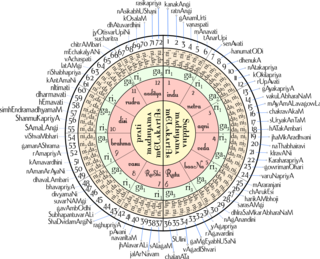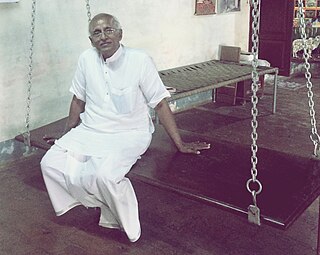Related Research Articles

Music is the art of arranging sounds in time to produce a composition through the elements of melody, harmony, rhythm, and timbre. It is one of the universal cultural aspects of all human societies. General definitions of music include common elements such as pitch, rhythm, dynamics, and the sonic qualities of timbre and texture. Different styles or types of music may emphasize, de-emphasize or omit some of these elements. Music is performed with a vast range of instruments and vocal techniques ranging from singing to rapping; there are solely instrumental pieces, solely vocal pieces and pieces that combine singing and instruments. The word derives from Greek μουσική.
Musicology is the scholarly analysis and research-based study of music. Musicology departments traditionally belong to the humanities, although some music research is scientific in focus. Some geographers and anthropologists have an interest in musicology so the social sciences also have an academic interest. A scholar who participates in musical research is a musicologist.

Ethnomusicology is the study of music from the cultural and social aspects of the people who make it. It encompasses distinct theoretical and methodical approaches that emphasize cultural, social, material, cognitive, biological, and other dimensions or contexts of musical behavior, in addition to the sound component.

Carnatic music, known as Karnāṭaka saṃgīta or Karnāṭaka saṅgītam in the South Indian languages, is a system of music commonly associated with South India, including the modern Indian states of Karnataka, Andhra Pradesh, Telangana, Kerala and Tamil Nadu, and Sri Lanka. It is one of two main subgenres of Indian classical music that evolved from ancient Sanatana dharma sciences and traditions, particularly the Samaveda. The other subgenre being Hindustani music, which emerged as a distinct form because of Persian or Islamic influences from Northern India. The main emphasis in Carnatic music is on vocal music; most compositions are written to be sung, and even when played on instruments, they are meant to be performed in gāyaki (singing) style. The heptatonic scale of Western musical notation is said to have its origins in Carnatic music, having been picked up by Pythagoras during his visit to India to learn mathematics, thus introducing it to the west. The circle of fifths and several other popular concepts in western classical music have their origins in the theory of Carnatic classical music.

A raga or raag is a melodic framework for improvisation akin to a melodic mode in Indian classical music. The rāga is a unique and central feature of the classical Indian music tradition, and as a result has no direct translation to concepts in classical European music. Each rāga is an array of melodic structures with musical motifs, considered in the Indian tradition to have the ability to "colour the mind" and affect the emotions of the audience.

Indian classical music is the classical music of the Indian subcontinent. It has two major traditions: the North Indian classical music tradition is called Hindustani, while the South Indian expression is called Carnatic. These traditions were not distinct until about the 15th century. During the period of Mughal rule of the Indian subcontinent, the traditions separated and evolved into distinct forms. Hindustani music emphasizes improvisation and exploration of all aspects of a raga, while Carnatic performances tend to be short composition-based. However, the two systems continue to have more common features than differences.
In Hindustani classical music, the jor is a formal section of composition in the long elaboration (alap) of a raga that forms the beginning of a performance. It comes after alap and precedes jhala, the climax. Jor is the instrumental equivalent of nomtom in the dhrupad vocal style of Indian music. Both have a simple pulse but no well-defined rhythmic cycle.

Music can be analysed by considering a variety of its elements, or parts, individually or together. A commonly used list of the main elements includes pitch, timbre, texture, volume, duration, and form. The elements of music may be compared to the elements of art or design.
Martin Stokes is King Edward Professor of Music at the King's College London in the United Kingdom. He has special research interests in ethnomusicology and anthropology, as well as Middle Eastern popular music.
Musical nationalism refers to the use of musical ideas or motifs that are identified with a specific country, region, or ethnicity, such as folk tunes and melodies, rhythms, and harmonies inspired by them.

Alan Parkhurst Merriam was an American cultural anthropologist and ethnomusicologist. He is known for his studies of music in Native America and Africa. In his book The Anthropology of Music (1964), he outlined and develops a theory and method for studying music from an anthropological perspective with anthropological methods. Although he taught at Northwestern University and University of Wisconsin, the majority of his academic career was spent at Indiana University where he was named a professor in 1962 and then chairman of the anthropology department from 1966 to 1969, which became a leading center of ethnomusicology research under his guidance. He was a co-founder of the Society for Ethnomusicology in 1952 and held the elected post of president of that society from 1963 to 1965. He edited the Newsletter of the Society for Ethnomusicology from 1952 to 1957, and he edited the journal Ethnomusicology from 1957 to 1958.
Pandit Ritwik Sanyal is an Indian classical singer and the Dhrupad maestro from Varanasi. He is a retired professor and Ex Dean from the department of vocal music at the faculty of performing arts at Banaras Hindu University. Pandit Ritwik Sanyal received the highest award for music in India, Sangeet Natak Akademi Award from President of India Hon. Shri Pranab Mukherji, 2013
The Society for Ethnomusicology is, with the International Council for Traditional Music and the British Forum for Ethnomusicology, one of three major international associations for ethnomusicology. Its mission is "to promote the research, study, and performance of music in all historical periods and cultural contexts."

Nacni means female dancer in north Indian languages. In the east-central Indian states of Jharkhand, West Bengal, and Orissa, the term nacnī refers to female performers who sing and dance professionally in rural areas, accompanied by male ḍhulkī and nagarā drummers who move around the stage with her.
Métis fiddle is the style that the Métis of Canada and Métis in the northern United States have developed to play the violin, solo and in folk ensembles. It is marked by the percussive use of the bow and percussive accompaniment. The Metis people are a poly-ethnic post-contact Indigenous peoples. Fiddles were "introduced in this area by Scottish and French-Canadian fur traders in the early 1800s", where the Metis community adopted the instrument into their culture.
William Oscar "Willie" Anku was a Ghanaian music theorist, ethnomusicologist, composer, and performer. His work combined Western set theory with computer programming and experience in working with performers of various West African musical traditions to create a comprehensive theory of African rhythm. He was "unique among Africa-based music theorists in attracting the attention of the US-based Society for Music Theory," being invited to give plenary lectures and receiving tributes from prominent US-based theorists.
Stephen Blum is an American scholar and musician, whose research has primarily been in ethnomusicology. He has lent a multidisciplinary approach to the writing and publication of numerous articles discussing a wide range of musical topics and ideas.

The Department of Music is the music school of the University of Durham.
David Richard Widdess, FBA is a musicologist and academic. Since 2005, he has been Professor of Musicology at the School of Oriental and African Studies, University of London.

Karaikudi Sambasiva Iyer Subramanian is a veena player in the Karaikudi Veena Tradition. He is the grandson of Karaikudi Subbarama Iyer and adoptive son of Karaikudi Sambasiva Iyer.